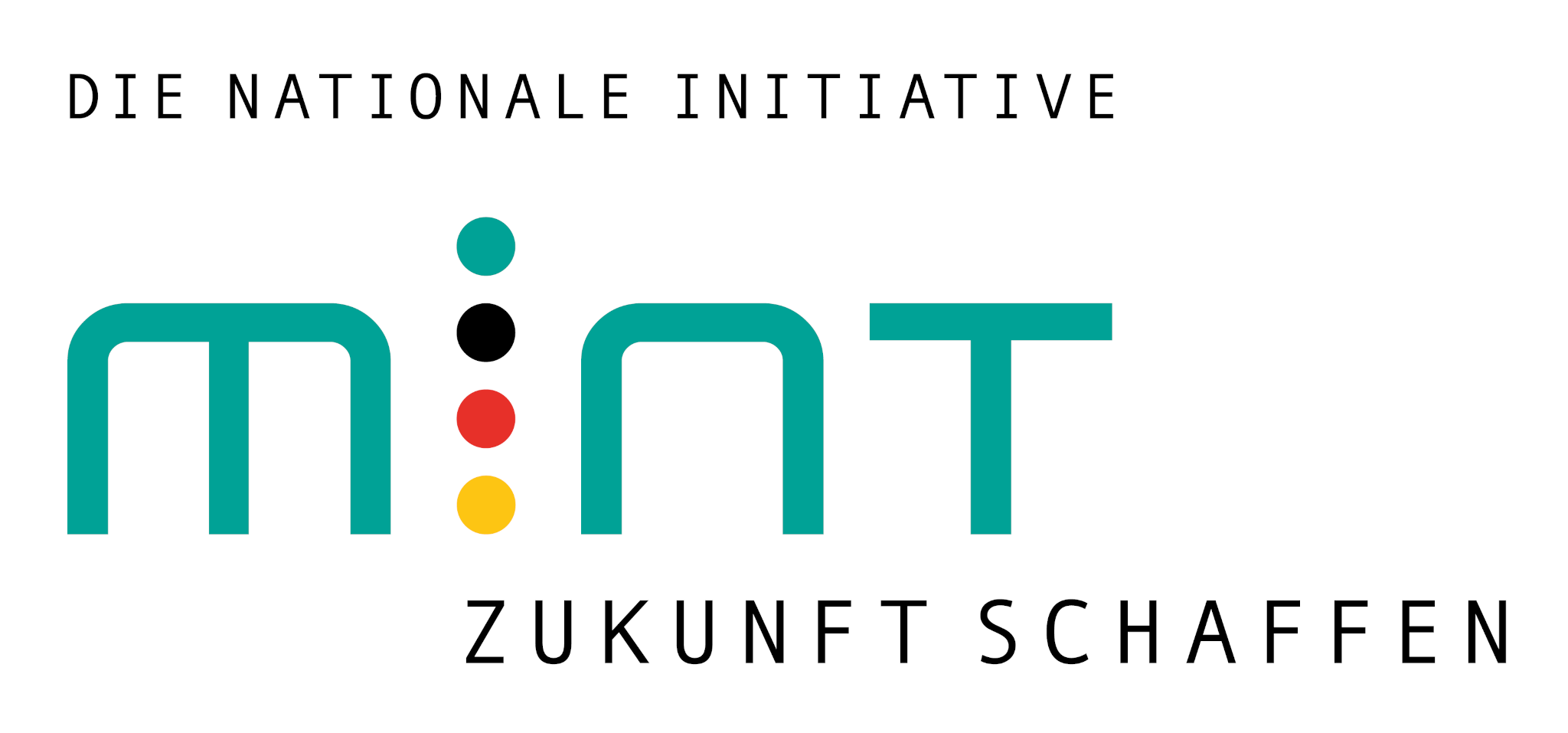SciencePub Heidelberg
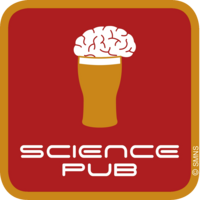
Seit dem Sommersemester 2022 findet auch in der wunderschönen Universitätsstadt am Neckar ein SciencePub statt. Wenn ihr schon immer einmal eure ProfesorInnen in einer entspannten Atmosphäre kennenlernen oder einfach einmal in andere Fachbereiche hineinschauen wolltet, seid ihr an vier Abenden im Semester im Café Leitstelle (Emil-Maier-Straße 16, 69115 Heidelberg; "Alte Feuerwache") herzlich willkommen.
Ab sofort werden wir im Semester regelmäßig ForscherInnen einladen, mit euch ihre aktuelle Arbeit zu teilen oder einfach nur auf allgemeinverständliche Weise über ihr Fachgebiet zu sprechen. Und dabei könnt ihr ganz entspannt ein Bier oder einen Cocktail genießen!
Eintritt ist natürlich frei.
Instagram: sciencepub_hd
+++ AKTUELLE TERMINE +++
Wintersemester 24/25
15.01.2025: 19 Uhr, Café Leitstelle
SciencePub mit Pubquiz: 'Innovative Vulkanforschung am Ätna - eine Geschichte über Vulkanausbrüche und Besenstile'
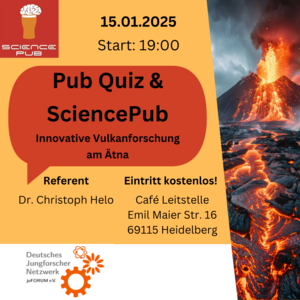
Im SciencePub erwarten dich spannende Einblicke in aktuelle Forschung und faszinierende wissenschaftliche Themen – präsentiert in lockerer Pub-Atmosphäre. Ein besonderes Highlight des Abends wird unser interaktives SciencePubQuiz sein: Teste dein Wissen, stelle dich kniffligen Fragen und gewinne tolle Preise!
Als Referent kommt Dr. Christoph Helo aus Mainz, ein Experte für Vulkanologie und die Entstehung magmatischer Gesteine. Er erforscht unter anderem submarine Vulkanaktivität an mittelozeanischen Rücken, die Analyse flüchtiger Bestandteile in Magmen und Experimente unter extremen Bedingungen. Außerdem leitet er ein Labor für die Untersuchung von mafischen Magmen und ist Teil einer Forschungsexpedition am Ostpazifischen Rücken.
Freu dich auf einen Abend voller Wissen, Austausch und Spaß!
Sommersemester 2024
Weitere Termine:
Sobald die Termine und Themen für das Wintersemester stehen, werden sie hier bekannt gegeben. Seid gespannt!
As soon as the dates and topics for the winter semester are available, they will be announced here. Stay tuned!
09.07.2024: 19 Uhr, Café Leitstelle
SciencePub: The Future of Biology
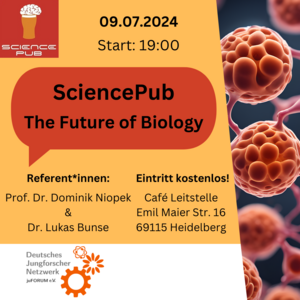
The last SciencePub of this semester is a special treat. We are happy to welcome Prof. Dr. Dominik Niopek and Dr. Lukas Bunse – two renowned and award-winning scientists. Both conduct research in different fields of Biology to develop new techniques to treat illness.
Join us with a cold drink of your choice and learn how AI can dream up new proteins for biotechnological and medical applications and what we can learn from Star Wars spaceships about fighting brain tumors.
Prof. Dr. Dominik Niopek studied Molecular Biotechnology at the University of Heidelberg. He then conducted research at the German Cancer Research Center, where he completed his dissertation entitled "Optogenetic Control of Nucleocytoplasmic Protein Transport" in 2016. He is now head of the "Synthetic Biology" research group at the University of Heidelberg.
Dr. Lukas Bunse studied medicine at the University of Heidelberg and University College London (UK). His medical doctoral thesis dealt with certain spontaneous immune responses in glioma patients. In 2020, he completed another doctoral thesis in biology. He is a clinical scientist at the Medical Faculty Mannheim and has been doing his specialist training as a neurologist at the Neurological Clinic of the UMM since 2019. He is also an independent team leader in the Clinical Cooperation Unit Neuroimmunology and Brain Tumor Immunology at the German Cancer Research Center (DKFZ).
Here are our talks:
Prof. Dr. Dominik Niopek: Designer Proteins: Towards AI-inspired Nanomachines
Proteins are key components in cells, acting as structural scaffolds, biocatalysts, communication devices, and sophisticated molecular machines. They are composed of chains of amino acids that fold into complex 3D structures that determine their function. Computational models based on artificial intelligence (AI) are currently revolutionizing the field of protein structure prediction, thereby paving the way for the in silico design of artificial proteins acting as molecular nanomachines with tailored functionalities.
In his talk, Prof. Dr. Dominik Niopek will showcase how Google Deepmind's AlphaFold and similar AI-models for protein structure prediction can be pushed to "dream up" new-to-nature proteins, representing a new paradigm in protein engineering. He will illustrate the enormous potential of these upcoming protein design methods for biotechnology and medicine, but also address their current limitations. Finally, he will discuss emerging issues related to the ownership and commercialization of AI-based protein design technologies and how they may affect both scientific progress and future real-world application.
Dr. Lukas Bunse: About T-wing Interceptors in Star Wars – a perspective on future immunotherapies against brain tumors
Brain tumors grow in a particularly shielded microenvironment. Evolution has come up with a plethora of ideas to prevent conquest of the brain by external forces. Moreover, tumor cells share many features with healthy cells such as neurons, oligodendrocytes or star-like cells (astrocytes), which hampers the discrimination of tumoral and healthy cells. As a unique external factor, T cells have the potential to conquer and discriminate brain tumor cells. However, at the time of brain tumor diagnosis, naturally existing T cells have already lost the battle of effective immunosurveillance against tumoral immune escape. Prospectively, target-specific training and engineering of T cells, from gene therapy to adding synthetic components, may change the outcome of this notoriously unequal fight.
11.06.2024: 19 Uhr, Café Leitstelle
SciencePub: Schlüssel zur Selbstwirksamkeit in der Klimakrise
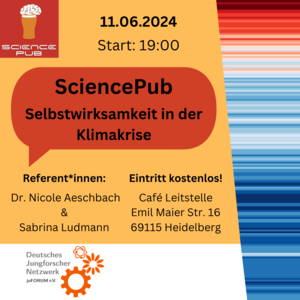
Was euch erwartet: Wir laden Dr. Nicole Aeschbach und Sabrina Ludmann ein. Dr. Nicole Aeschbach präsentiert das Konzept einer Climate Action Literacy. Sie tritt in den interaktiven Austausch mit den Teilnehmenden und stellt ein von ihr an der HSE entwickeltes digitales Lernmaterial vor. Sabrina Ludmann stellt ihre Forschung am ifeu (Institut für Energie- und Umweltforschung) vor.
Wir freuen uns auf spannende Diskussionen im Anschluss an die Vorträge. :)
Dr. Nicole Aeschbach ist Senior Scientist in der 3D Geospatial Data Processing (3DGeo) Research Group am Geographischen Institut der Universität Heidelberg und wissenschaftliche Mitarbeiterin an der Heidelberg School of Education (HSE), einer gemeinsamen Einrichtung von Universität und Pädagogischer Hochschule Heidelberg. Ihr Arbeitsschwerpunkt liegt auf der transdisziplinären Forschung und Lehre zu den Themenbereichen Umwelt- und Klimawandel und zum Querschnittsfeld Nachhaltigkeit. Sie konzipiert forschungsbasierte partizipative Lehr-Lernsettings und setzt diese in den Geographiestudiengängen sowie an der Heidelberg School of Education um.
Sabrina Ludmann ist wissenschaftliche Mitarbeiterin am ifeu in Heidelberg. Sie beschäftigt sich mit den Themengebieten Rohstoffe und natürliche Ressourcen sowie Ökobilanzen, Ökoprofile und Stoffstromanalysen. Sie hat unter anderem am EUROSTAT Europäisches Umweltdatenzentrum für natürliche Ressourcen gearbeitet und am Forschungsprojekt "PeerSharing", bei dem es um das Teilen von Produkten zwischen Privatpersonen im Rahmen der Sharing Economy geht.
--- Dieses Event findet auf deutsch statt. / This event will be held in German. ---
14.05.2024: 19 Uhr, Café Leitstelle
SciencePub meets HITS
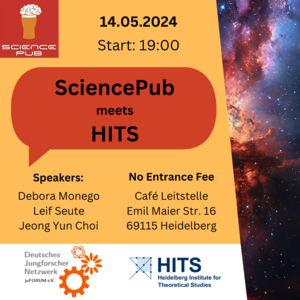
The renowned Heidelberg Institute for Theoretical Studies (HITS) conducts basic research in the natural sciences, mathematical and computer science. Major research directions include complex simulations across scales, making sense of data, and enabling science via computational research. Application areas range from molecular biology to astrophysics.
We are happy to welcome three young researchers from the HITS for an evening with talks covering all scales between molecules and the vast emptiness of space. Join with a cold drink of your choice and learn more about the sound of stars, the proteins in your body and and how machine learning can be applied to molecular mechanics. And, above all, learn more about exciting research at one of the leading institutes in the world.
Here are our talks:
Jeong Yun Choi: How do we study the stars with sound?
We love beautiful images of the Moon, stars, colorful nebulae, and galaxies. But astronomy is not just about seeing things as they are, it is also about ‘seeing’ the sounds of space. Stars are very noisy places, but those sounds are trapped and can’t travel in a vacuum. So, what we do is observe these sounds through the vibration of the stars - brighter and dimmer. Blinking stars offer astronomers a powerful tool to study their properties. Join us to explore how we study the sound of stars!
Debora Monego: The exciting world of our proteins
A force of 10 piconewtons is applied to your body. Your fibrous proteins respond by bending, stretching, and buckling. Are you in trouble? Join us in to learn how we can use computer simulations to study processes like this and find out!
Leif Seute: Machine learning meets molecular mechanics
Simulating large molecular systems over long timescales requires the computational prediction of energies and forces to be both accurate and fast. In recent years, machine learning has lifted the tension between accuracy and efficiency. However, existing models are still orders of magnitude more costly than Molecular Mechanics, the approximate description of quantum chemical systems with classical physics. We have developed a method, Grappa, of combining machine learning with Molecular Mechanics, which has improved accuracy at the same cost and is transferable to previously uncharted regions of chemical space.
23.04.2024: 19 Uhr, Café Leitstelle
SciencePubQuiz: A SciencePub Special Edition Vol. 2
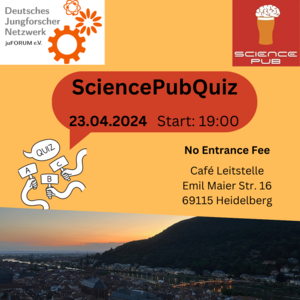
Join us for another unforgettable night of knowledge and fun at SciencePubQuiz!
After the thrilling success of our inaugural event, we're excited to invite you to the second edition of the SciencePubQuiz in Heidelberg! Are you ready to put your scientific smarts to the test once more and have an absolute blast while doing it? Then, don’t miss out on this special edition of SciencePub: the juFORUM SciencePubQuiz’s electrifying return!
Prepare to embark on an exhilarating journey through the vast realms of science, from the enigmatic expanses of the cosmos to the intricate wonders of the human mind. It doesn’t matter if you’re a veteran scientist or a curious mind eager to explore; our SciencePubQuiz has something to captivate everyone.
What to Expect:
✨ Even More Engaging and Mind-Boggling Quiz Questions
✨ Friendly Competition with Fellow Science Enthusiasts
✨ A Small Prize for the Top Team
✨ Refreshing Drinks at Cafe Leitstelle
✨ Fascinating Discussions with Like-Minded Individuals
The first quiz was a blast, filled with moments of keen competition and camaraderie. Now, we’re looking to recreate that magic and dial up the excitement. Gather your friends, colleagues, or fellow science aficionados, and assemble a team that’s ready to rise to the challenge. This is your chance to not only test your knowledge but to make new friends and revel in the wonders of science together.
See you at the SciencePub Quiz – Where Science Meets Entertainment! :)
Don't miss out on this evening where we celebrate curiosity, challenge our intellects, and enjoy the company of fellow science enthusiasts. Let’s make the second SciencePubQuiz even more memorable than the first!
Wintersemester 2023/24
16.01.2024: 19 Uhr, Cafe Leitstelle
SciencePub: Preparedness and Prevention of Infectious Diseases driven by Climate and Environmental Change
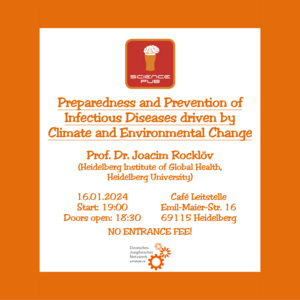
Abstract: Climate change threatens the health of planetary ecosystems and global population through multifaceted pathways. Among the more well known mechanism, it catalyzes the risk of infectious diseases in people spread by insects, reservoir animals or in the environment. Strategies to adapt to these risks involve improved preparedness systems for early infectious disease outbreak detection, integrated surveillance prediction systems, but more rarely illustrate potential to reduce the risks upstream. In this talk, we will discuss how modelling can help identify opportunities for upstream risk reduction and how novel surveillance, citizen science, and nature-based solutions can be viable tools for the prevention of infectious diseases.
Prof. Dr. Joacim Rocklöv only recently came to Heidelberg University from Sweden after being awarded the Alexander von Humboldt Professorship of The Federal Ministry of Education and Research. He is epidemiologist, modeler and data scientist and works at the Heidelberg Institute of Global Health (HIGH) as well as the Interdisciplinary Centre for Scientific Computing (IWR).
12.12.2023: 19 Uhr, Cafe Leitstelle
SciencePub: Lighting up AI: can photonics revolutionize machine learning?
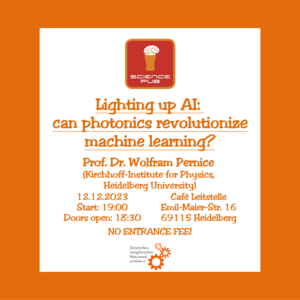
Abstract: Immense progress in artificial intelligence is rapidly transforming everyday life – at the cost of unsustainable power consumption. Exponentially growing demand for higher and higher data rates and lower and lower latency is driving the development of not only new computing approaches, but entirely new platforms for information processing. Photonic circuits which use light instead of electrons are one promising candidate platform where optical signals are processed in analogy to currents and voltages in integrated electrical circuits. We will explore how one can compute with light and why that may be a good idea for next-generation AI.
Prof. Dr. Wolfram Pernice works with his research group at the Kirchhoff-Institute for Physics (Heidelberg University) on brain-inspired hardware. Together, they try to come up with new ideas for information processing and for building prototypes in the lab.
21.11.2023: 19 Uhr, Cafe Leitstelle
SciencePub: „Keine Experimente!“ – Understanding ‚Experiment Aversion‘
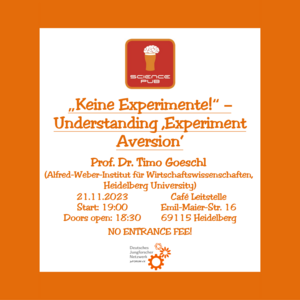
Abstract: The last twenty-five years have seen the rise of evidence-based policy-making. Its most avid practitioners have been enthusiastically embracing the idea of purposeful policy experimentation for social ends, and economists have been perfecting the experimental toolbox. There is emerging evidence, however, that the general public is averse to social experimentation, and strongly so. Such ‘experiment aversion’ could seriously limit our ability to fully exploit experimental evidence for better policies. What exactly do social scientists mean by ‘experiment aversion’? And is it really a threat to evidence-based policy-making? – We will find out.
Prof. Timo Goeschl is professor for environmental economics at the Alfred-Weber-Insitute at Heidelberg University and board member of the Heidelberg Centre for the Environment. He was a consultant for numerous public and private organizations including the World Bank and the German parliament. His current research focusses on the economics of climate change.
25.10.2023: 19 Uhr, Café Leitstelle
SciencePubQuiz: A SciencePub Special Edition
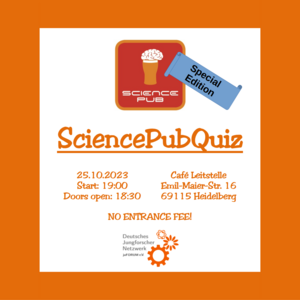
Join us for an unforgettable night of knowledge and fun at SciencePubQuiz!
Are you ready to put your scientific smarts to the test and have a blast while doing it? Join us for a special edition of the SciencePub: the first juFORUM SciencePubQuiz in Heidelberg!
Get ready to embark on a thrilling journey through the realms of science, from the mysteries of the cosmos to the wonders of the human mind. Whether you're a seasoned scientist or just a curious explorer, there's something for everyone at our SciencePubQuiz.
What to Expect:
✨ Engaging and Mind-Boggling Quiz Questions
✨ Friendly Competition with Fellow Science Enthusiasts
✨ A small Prize for the Top Team
✨ Refreshing Drinks at Cafe Leitstelle
✨ Fascinating Discussions with Like-Minded Individuals
Round up your friends, colleagues, or fellow science aficionados, and put together a team that's ready to conquer the quiz! Don't miss out on this chance to test your knowledge, make new friends, and celebrate the wonders of science.
See you at SciencePub Quiz - Where Science Meets Entertainment! :)
Sommersemester 2023
18.07.2023: 19 Uhr, Café Leitstelle
SciencePub: Emergence of collective behavior, atom by atom
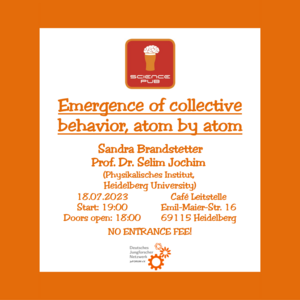
Abstract: "Collective behavior, that results in phenomena that are not immediately obvious from the properties of the constituents are ubiquitous in nature. In quantum physics, this explains astonishing properties of liquids and solids at low temperatures, such as superconductors in which current flows without resistance.
In our experiments we investigate how such collective behaviour emerges as we increase the size of our quantum systems, atom by atom. We start by exploring the antisymmetric exchange property of two fermions that gives rise to what is known as the Pauli principle, and find fluid behavior as we increase the system size to about 10 atoms."
Prof. Dr. Selim Jochim works at the Physikalisches Institut (Heidelberg University) on ultra-cold quantum gases. In his lab, several experiments on fundamental properties of quantum systems are carried out. Sandra Brandstetter is a PhD student in the group of Prof. Jochim working on 2D Fermi gases.
20.06.2023: 19 Uhr, Café Leitstelle
SciencePub: The Puzzles of Climate Policy
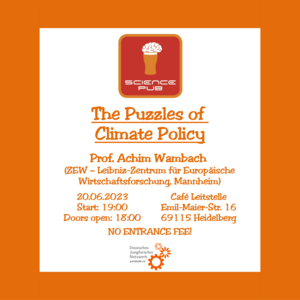
Abstract: "Climate policy measures and the market mechanisms behind them sometimes function in the opposite direction or quite differently than intended by policymakers or expected by consumers: Solar panels may make economic sense, but lead not to CO2 reduction in Europe. Neither does flying in Europe or buying green electricity, while driving less does, at least at present. We need to rethink climate protection: less moral appeals to individuals, and instead better political frameworks and more trust in markets that will make climate protection economically viable."
Prof. Achim Wambach is the president of the ZEW - Leibniz-Zentrum für Europäische Wirtschaftsforschung in Mannheim. According to FAZ, he is among the 30 most influential economists in Germany. Currently, he is part of the scientific advisory board of the German federal ministry of economics and climate protection and used to be head of the federal monopoly commission. At ZEW, he works on market design (especially with respect to mitigating climate change) and monopolies. Prof. Wambach has a PhD in physics from the University of Oxford, which he received before changing to economics.
16.05.2023: 19 Uhr, Café Leitstelle
SciencePub: Quantentechnologie – vom Urknall zur Ozeanographie und wieder retour
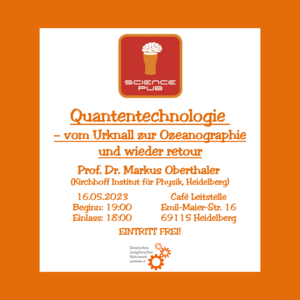
Darum geht es: "Moderne Quantentechnologien erlauben uns heute Experimente im Labor durchzuführen, die noch vor wenigen Jahren unvorstellbar waren. Ich will Einblicke geben wie die einzigartige Kontrolle von Materie mit Licht neuartige Möglichkeiten eröffnet und jetzt erlaubt sowohl das Alter von Wasser zu bestimmen als auch die Frage nach der Teilchenproduktion direkt nach dem Urknall zu klären."
Prof. Dr. Markus Oberthaler forscht an Quantensystemen am Kirchhoff Institut für Physik der Universität Heidelberg. Seine Forschung reicht von Bose-Einstein Kondensaten bis hin zu Klimaforschung mittels Isotopenanalyse. Er arbeitet außerdem an Quantensimulatoren, die zum Beispiel zur Erforschung des frühen Universums beitragen sollen. Den SciencePub Vortrag wird er auf Tirolerisch und Denglisch halten.
25.04.2023: 19 Uhr, Café Leitstelle
SciencePub: Viral Hepatitis and Beyond - Basic Research and Cure
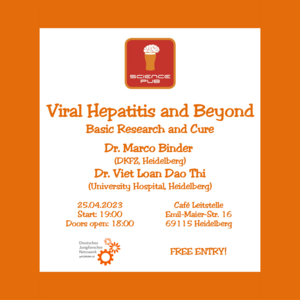
Abstract: You likely know about the ABC of hepatitis viruses– or so you think. But have you ever heard of hepatitis E or G? And that you can get hepatitis by drinking water or eating undercooked pork? We will discuss the many ways of how you can be exposed to the alphabet of hepatitis viruses and the wide spectrum of diseases they cause, all of which are called “hepatitis”.
We will then have a closer look at the molecular level of infection. The very first hours of an infection often are a literal race for victory. We will present examples of the many strategies viruses have developed to outsmart the antiviral defense program built right into every single cell of our body. Ultimately, we want to lay out how researchers aim to apply their findings to therapeutically redirect the immune system such that it may even gain control over chronic infections again.
Dr. Marco Binder is working at the German Cancer Research Center (DKFZ) in Heidelberg on cell-intrinsic anti-viral signaling and viral replication. He and his team deal with viruses such as Hepatitis and SARS-CoV2 (the coronavirus). In case of the coronavirus, they studied the interplay between the virus and the cellular defense machinery.
Dr. Viet Loan Dao Thi is working at the Center of Integrative Infectious Disease Research at the University Hospital in Heidelberg on hepatitis E virus-host interactions. They use stem cells in her lab to study the virus and his lifecycle at the molecular level.
Wintersemester 2022/23
24.01.2023: 19 Uhr, Café Leitstelle
SciencePub: Meteorite Impacts on Earth: Boon or Bane from Space?

Abstract: Meteorites are travellers from space that fall on Earth as small or large rocks. While small meteorites preserve the memory of planet formation processes in the early solar system, large meteorite impacts may be catastrophic, as repeatedly happened in the geologic history of our home planet. Space missions are planned that may deflect celestial objects potentially dangerous to Earth.
Prof. Dr. Mario Trieloff is working at the Insitute of Earth Sciences at the University of Heidelberg. His research focusses on the formation of Earth and other planets in our solar system as well as meteorites. He analyzes dust from meteorites as well as impact craters on Earth in order to find out more about these travellers from space.
20.12.2022: 19 Uhr, Café Leitstelle
SciencePub: Malaria: old disease, new problems?
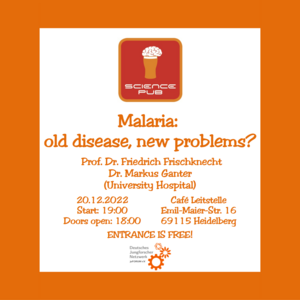
Abstract: Malaria has accompanied us since we became humans and yet parasite and host have not become accustomed to each other. Currently this disease is getting more and more out of control and at the same time the pathogen helps us to answer fundamental questions of modern biology. Our lecture will shed light on these opposing aspects and we will look into the future of humans and malaria.
Prof. Dr. Friedrich Frischknecht and Dr. Markus Ganter are working at the Centre for Infectious Diseases and Parasitology at the Heidelberg University Hospital. Both have their own research group focussing on different aspects of malaria.
22.11.2022: 19 Uhr, Café Leitstelle
SciencePub: Climate + Culture = Collapse?

Abstract: Climate change is here. Starting with the past summers, water scarcity has become a topic even in Germany. But this problem is at least as old as human society itself, and societies around the globe have thought of various solutions to it - in the past and still today. With the science talk we undertake a virtual trip around the world, visiting the Nasca in Peru, the Maya and the ancient Greeks to see how these societies adapted to climate and its changes – or failed.
Prof. Dr. Ingmar Unkel is professor for geography at the University of Heidelberg. He only arrived in Heidelberg this summer after having been professor in Kiel for several years. For his research, he is travelling all around the world to take sediment cores from lakes.
25.10.2022: 19 Uhr, Café Regie
SciencePub: Quantum Technologies - Why Google and Alibaba are interested in Schrödinger’s Cat
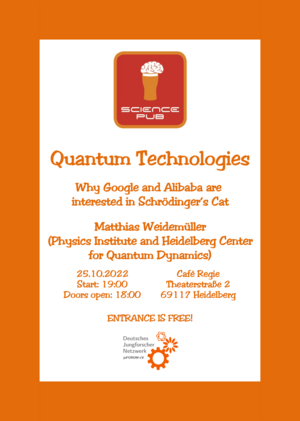
Abstract: We are witnessing the Second Quantum Revolution, which enables almost unlimited control of single quantum objects down to single atoms, molecules and photons. Experiments, which would have been considered pure “Gedanken” experiments some years ago, like, e.g., realizing quantum states resembling Schrödinger’s Cat, have now become routine in research labs at universities and start-up companies. Applications range from quantum computing over quantum cryptography to quantum sensors. In my talk, I will give an introduction into the basic features of quantum physics and show some of the most promising applications.
Prof. Dr. Matthias Weidemüller is professor for experimental physics at the Physics Institute of the Universität Heidelberg and member of the Heidelberg Center for Quantum Dynamics. He is also vice-rector for innovation and transfer at Universität Heidelberg.
Sommersemester 2022
13.07.2022: 19 Uhr, Café Regie
SciencePub: Medicine meets Machine Learning and Molecular Systems
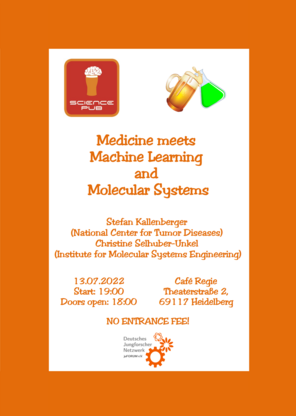
An diesem Abend wird es zwei Vorträge zu spannenden Entwicklungen in der Medizin und der Biotechnik geben.
Dr. Dr. Stefan Kallenberger: Medicine meets Machine Learning - Optimierung von Infusionsprotokollen durch Reinforcement Learning
Der Vortrag befasst sich mit der Frage, wie man den Effekt, der von einer bestimmten Dosis eines Medikaments ausgeht, verbessern kann. Es wird eine Methode zur Optimierung der Zeitverläufe von Wirkstoffkonzentrationen präsentiert, bei der Wissen über biochemische Signalwege in Zellen, repräsentiert durch mathematische Modelle, zum Einsatz kommt. Die Methode wurde in einem System zur Mikroskopie und Perfusion von Zellen realisiert.
Der Redner forscht am National Center for Tumor Diseases in Heidelberg.
Prof. Dr. Selhuber-Unkel: Molecular Systems Engineering: von Biomaterialien zu biohybrider Mikrorobotik
Lebende Systeme können aktiv und schnell auf äußere mechanische Reize reagieren. Die Nachahmung solcher stimulusabhängigen Strategien durch molekulare Systeme kann Biomaterialien flexibler, anpassungsfähiger und möglicherweise sogar autonomer machen. Ich werde Konzepte vorstellen, die von photoresponsiven Biomaterialien zur Steuerung der Zelladhäsion durch molekulare Schalter bis hin zu mechanisch reagierenden biomimetischen Strukturen reichen und auch einen Ausblick auf biohybride Robotersysteme geben.
Die Rednerin leitet eine Arbeitsgruppe und ist Direktorin des neu gegründeten Institute for Molecular Systems Engineering der Universität Heidelberg.
14.06.2022: 19 Uhr, Café Regie
SciencePub: Wenn die Natur mathematisch spricht
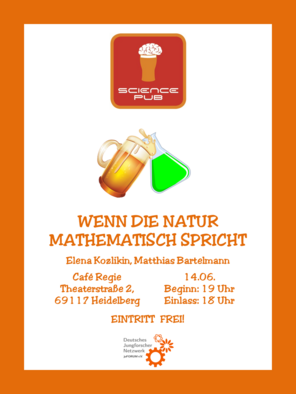
Abstract: Mathematik ist die Sprache der Physik, auch weil mathematische Strukturen Ordnung schaffen. Diese Ordnung klärt nicht nur im Nachhinein; sie ist auch konstruktiv: Besonders faszinierend wird sie dann, wenn sie etwas vorhersagt, was erst später in der Welt gefunden wird. Wir möchten von vier eindrucksvollen Beispielen erzählen: von Antimaterie, schwarzen Löchern, krummen Räumen und von der Einheitlichkeit des Zufalls.
Dr. Elena Kozlikin, Prof. Dr. Matthias Bartelmann: Institut für Theoretische Physik. Die beiden Autoren sind u.a. Experten für kosmische Strukturformierung. Sie versuchen unser Verständnis der Entstehung der großräumigen Strukturen in unserem Universum durch Anwendung der kinetischen Feldtheorie zu verbessern. Prof. Bartelmann ist außerdem Autor eines Standardlehrbuchs zur theoretischen Physik.

 juFORUM auf Facebook
juFORUM auf Facebook juFORUM auf Instagram
juFORUM auf Instagram